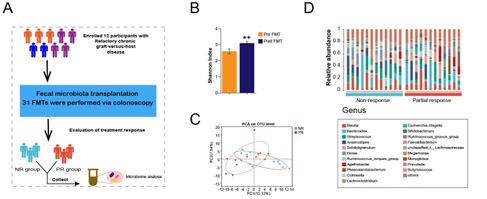Efficacy and safety of fecal microbiota transplantation in the treatment of chronic steroid-refractory graft-versus-host disease after hematopoietic stem cell transplantation
Introduction
The majority of patients who undergoing allogeneic hematopoietic stem cell transplantation (allo-HSCT) with acute gut graft-versus-host disease has lost the diversity of gastrointestinal microbiota and associated to adverse clinical outcome. Despite glucocorticoids treatment has been considered as the first-line therapy regardless acute or chronic GVHD, the curative efficiency and durable response remains unsatisfactory. Several studies suggesting that fecal microbiota transplantation (FMT) from healthy donor effectively alleviated gut steroid-refractory acute GVHD (SR-aGVHD) by restoring diversity of gastrointestinal microbiota, resistance to potential pathogens, and transforming essential materials to metabolites for immunomodulating donor T cell which improved clinical outcomes in allo-HSCT. However, it is still unclear whether FMT therapy have similar potential efficacy in treating steroid-refractory chronic GVHD (SR-cGVHD). Here, we report the results of a pilot study from our single center using FMT from unrelated healthy donor to treat patients with SR-cGVHD.
Method
12 patients aged 16-60 years with SR-cGVHD after allo-HSCT were enrolled. A total of 31 FMTs were performed via colonoscopy in 12 patients with SR-GvHD over three consecutive months. Adverse events with reasonable suspicion for being associated with FMT were monitored after treatment for 28 days. Partial response was defined as a decrease at least one stage in severity of GVHD or able to taper steroid dose. No response was defined as unable to taper steroid dose or need to increase or add immunosuppressor for controlling GVHD progression. CR was defined as the complete resolution of GVHD manifestations in all organs. To characterize the impact of the FMT on the gut microbiota, stool samples from recipients were collected the day before FMT treatment and 4 weeks after FMT treatment then carried out 16s rRNA sequencing.
Result
The overall response rate (ORR) in the patients with SR-cGvHD reached 50% (6/12), including CR in 0/0 (0%) cases and PR in 6/12 (50%). Most common adverse events were 3 abdominal bloating (9.68%), 2 diarrhea cases (6.45%) and 1 fever (3.23%). No serious adverse events were observed. The diversity of gastrointestinal microbiota remarkable decreased during SR-GVHD and it recovered after FMT (Figure B). After FMT treatment, similar α diversity of gastrointestinal microbiota in PR and NR patients was observed, whereas β-diversity analysis showed significant differences in the composition and abundance of the bacterial colonization between groups (Figure C and D).
Conclusion
The present study indicates that FMT as a new potential therapy in the treatment of SR-cGvHD is safe, well tolerated, and effective.
Disclosures
No relevant conflicts of interest to declare.
Disclosures
No relevant conflicts of interest to declare.


This feature is available to Subscribers Only
Sign In or Create an Account Close Modal